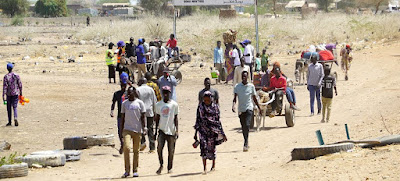“The time for action is now because the alternative is too terrible to contemplate” -Nicholas Haysom, UN Secretary-General’s Special Representative and Head of the UN Mission in South Sudan (UNMISS)
Read more in report from UN News
By Vibhu Mishra
Dated Monday, 24 March 2025 - full copy:
South Sudan on the brink of civil war, top UN official warns
South Sudan is teetering on the brink of a return to full-scale civil war as violence escalates and political tensions deepen, the head of the UN Mission in the country (UNMISS) warned on Monday.
Briefing journalists at UN Headquarters in New York via videolink from Juba, Nicholas Haysom described indiscriminate attacks on civilians, mass displacement and rising ethnic tensions.
He urged all parties to pull back from the brink and commit to peace before the country plunges into another devastating conflict.
“A conflict would erase all the hard-won gains made since the 2018 peace deal was signed. It would devastate not only South Sudan but the entire region, which simply cannot afford another war,” he warned.
Fragile peace at risk
South Sudan gained independence from Sudan in 2011, but the world’s youngest nation has been plagued by conflict and instability ever since.
A civil war erupted in 2013 between forces loyal to President Salva Kiir and those aligned with his former deputy, Riek Machar. The war – marked by ethnic violence, mass atrocities and widespread humanitarian crisis – lasted until a fragile peace deal was signed in 2018.
Though the 2018 Revitalized Peace Agreement brought a degree of stability, delays in its implementation and continued political rivalries have kept tensions simmering.
Mounting violence
The latest wave of violence erupted on 4 March when the so-called White Army – a youth militia – overran South Sudanese army barracks in Nasir, Upper Nile province.
In response, Government forces launched retaliatory aerial bombardments on civilian areas, using barrel bombs that allegedly contained highly flammable accelerants.
“These indiscriminate attacks on civilians are causing significant casualties and horrific injuries, especially burns, including to women and children,” Mr. Haysom said, adding that at least 63,000 people have fled the area.
Reports indicate that both the White Army and national forces are mobilising for further confrontations, with allegations of child recruitment into armed groups.
The deployment of foreign forces at the request of the Government has further heightened tensions, evoking painful memories of the country’s previous civil wars.
Rising ethnic tensions
Political tensions are also escalating, Mr. Haysom continued.
Senior officials affiliated with the Sudan People’s Liberation Movement in Opposition (SPLM-IO) – the main rival militia – have been removed, replaced, detained, or forced into hiding.
There is also an increasing use of misinformation, disinformation and hate speech, which is fuelling ethnic divisions and fear, making reconciliation even more difficult.
“Given this grim situation, we are left with no other conclusion, but to assess that South Sudan is teetering on the edge of a relapse into civil war,” the senior UN official warned.
Diplomatic efforts stalled
Mr. Haysom further reported that UNMISS has engaged in intensive diplomatic efforts alongside regional and international partners, including the African Union (AU), the regional development bloc, IGAD, and the Reconstituted Joint Monitoring and Evaluation Commission.
However, a scheduled high-level visit by IGAD foreign ministers to Juba, aimed at mediating between the parties, was abruptly postponed by the South Sudanese government without explanation.
“This is a disappointing development at a time when diplomatic outreach is more important than ever,” he said.
Recommit to peace
Mr. Haysom urged South Sudan’s leaders to immediately recommit to the 2018 peace deal, respect the ceasefire, release detained officials and resolve disputes through dialogue rather than military confrontation.
He also called for President Kiir and First Vice President Machar to meet and publicly reaffirm their joint commitment to peace.
“The time for action is now because the alternative is too terrible to contemplate.”
WATCH VIDEO: Nicholas Haysom, Special Representative of the UN Secretary-General for South Sudan speaks to the press via videolink.
View original: Here
End






 Photo: A camp for Internally Displaced Persons in Renk, South Sudan. (Credit: Dicastery for Promoting Integral Human Development)
Photo: A camp for Internally Displaced Persons in Renk, South Sudan. (Credit: Dicastery for Promoting Integral Human Development)